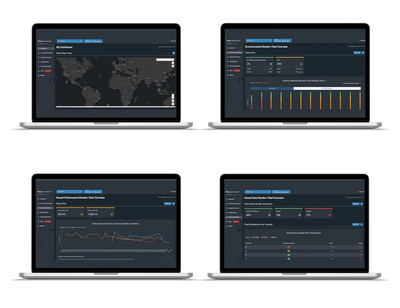A new era for shipping demands a focus on compliance and performance
The right software solution can help operators manage the dual demands of regulatory compliance and commercial opportunity
The shipping industry faces a once in a generation challenge: progressively reduce vessel carbon emissions while improving voyage performance. The ability to achieve this kind of transformation requires change on an organizational level - and the right support from stakeholders with a solid track record of delivery.
The tools that fleet operators need cover a laundry list of data and technology, but the important part is the ability to transform disparate pieces of information into actionable insights to support better business decisions.
The ability to achieve performance enhancements from a single floating asset to a complete fleet is an essential component of a digital strategy. The need for improvement stretches from daily routines and maintenance to the commercial drivers that sit behind investment and chartering decisions.
Another important component is the ability to demonstrate compliance with increasingly rigorous regulations. As regulation moves from prescriptive rules towards financial incentives and penalties, operators need to understand where the risks lie and how to manage them.
Understanding the challenge
Supporting operators with solutions that help enable performance and help ensure compliance requires a standardized approach to data – something the industry largely lacks – that can draw on diverse sources and present the information and resulting insights required.
This enables users to identify where data gaps might occur and identify inconsistencies. Only if a platform can demonstrate credibility, reliability and trust will industry see a case for investment.
There is a need too, for a modern system architecture capable of delivering the best capability in the shortest time. This demand has underpinned the shift toward the software as a service (SaaS) approach which lowers the total cost of ownership for the buyer as they can subscribe to a platform without also having to maintain it, especially important with the ever-changing regulatory landscape.
Open APIs to allow connectivity and aggregation from different data sources and when users spend less time figuring out how to work with something, they can spend more time sharing information and knowledge.
Compliance
As the demands of regulatory compliance in shipping increase further, they also become more complicated for operators. The industry is comfortable with reporting historical emissions data but the burden for ship and shore will increase once the European Union’s Emissions Trading System moves into full scale operations.
Beyond that, the Fuel EU Maritime regulation creates a more complicated landscape in which to operate, with multiple options for compliance. The International Maritime Organization’s deliberation on a global carbon levy will not be resolved any time soon, but for the first time, such an instrument is looking like a reality.
One thing is certain: until now, compliance with maritime regulation has been a relatively simple affair; in future, it will be much more complicated.
Performance
By this stage in the digitalization and decarbonization cycle, vessel operators may be leery of the products being sold to them.
Understandably there’s a range of maturity in adoption; some operators have their own systems; others have made investments in third party solutions. It is likely though, that the majority of companies are still figuring out how find a solution that fits their profile and implement it.
Among the most common complaints we hear is ‘I see data but so what?’ Displaying data is the easy part, the value is in making that data consumable enough to drive business decisions. There are many potential outliers and disruptors to accurate data that users need to recognize in order to interrogate and investigate easily.
A huge contribution to success is being able to connect the shore personnel to the fleet in as close to real time as possible. Not having to wait until all the data is in before acting creates opportunities for better and more transparent decision-making.
ABS Wavesight
As the pressure for higher performance and regulatory compliance grow, we’ve been listening and thinking about how we can help customers adopt a platform that addresses both challenges.
ABS Wavesight was founded to bring together deep industry knowledge of a class leader with excellence in software products. In doing so, we’ve been able to help customers gather the data that creates visibility on their fleets and drives decisions for compliance and daily shipping operations.
ABS is grounded in regulation, certification and compliance; we’re the responsible party that can help customers address their fleet performance and optimization needs with confidence.
ABS Wavesight’s My Digital Fleet has been re-imagined within a true SaaS architecture, designed around more reliable access to the data that users need, presented intuitively to support high value insights and better decision-making.
Those insights are set to move from forecasting to predictability in the near future, reflecting the ability to create ‘what-if’ voyage scenarios which can play out in real-time.
From securing more competitive charters to the timing of maintenance and the ability to predict compliance costs, we believe better, data-driven decisions are needed.
Click here to learn more about ABS Wavesight My Digital Fleet™





